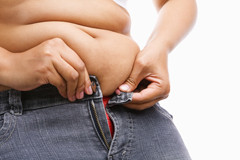Losing weight and belly fat improves sleep

Do you have trouble sleeping? If you’re carrying extra pounds, especially around your belly, losing weight and some of that muffin top may help you get better ZZZs. So say researchers from Johns Hopkins University School of Medicine, who presented their findings at this year’s annual meeting of the American Heart Association.
The Hopkins researchers recruited 77 overweight volunteers with either prediabetes or type 2 diabetes. Many reported sleep problems such as sleep apnea, daytime fatigue, insomnia, and restless or interrupted sleep. Half of the volunteers went on a weight-loss diet with supervised exercise training. The other half did just the diet. After six months, participants in both groups had lost an average of 15 pounds and reduced their belly fat by 15%. Sleep quality improved in both groups. A reduction in belly fat was the best predictor of improved sleep.
The results of this trial are in line with other studies exploring how weight affects sleep and sleep affects weight.
Linking weight loss, belly fat, and sleep
Excess weight and body fat increase the likelihood of developing obstructive sleep apnea. This condition occurs when the airway becomes blocked, either completely or partially, during sleep. These temporary blockages causes frequent awakenings which, in turn, increase the risk for conditions such as high blood pressure, stroke, and heart disease.
“So one possibility with the results of this study is that weight loss reduced sleep apnea and improved sleep quality,�� says sleep expert Dr. Lawrence Epstein, an instructor in medicine at Harvard Medical School. Weight loss also improves blood sugar control which, in people with diabetes or prediabetes, could reduce restless legs syndrome and periodic limb movement disorders, two sleep disorders that people with diabetes are prone to having.
Exercise has also been shown to improve sleep quality. For example, Oregon State University researchers found that slept better and felt more alert during the day than those who didn’t exercise much. (Don’t exercise right before bedtime, however. That can make it difficult to fall asleep.)
Why reducing belly fat might be a key to improved sleep remains a mystery. We do know that fat deposited around the abdomen, called visceral fat, is associated with heart disease, diabetes, dementia, breast and colon cancers, and other chronic health conditions. Losing belly fat, then, seems like a logical way to improve not only sleep but also overall health. Unfortunately, it isn’t that simple.
��Where you lose weight is partly determined by genetics,�� says Dr. I-Min Lee, professor of medicine at Harvard Medical School and an expert on physical activity’s role in promoting health and preventing chronic disease. “Generally, if you lose weight, some of this will occur in belly fat. You just can’t predict how much.��
Improving sleep
Despite what thousands of websites want you to believe, there are no exercises or potions that “melt away�� belly fat. Instead, the solution is old-fashioned exercise and a healthy diet.
If you are serious about losing weight and sleeping better, aim for 150 minutes of moderate-intensity physical activity (like swimming or brisk walking) each week. You don’t have to do five 30-minute workouts. More but shorter exercise sessions, such as three 10-minute brisk walks instead of one 30-minute walk, will have the same impact, says Dr. Lee.
Exercise alone generally doesn’t lead to substantial weight loss. That requires cutting back on daily calories.
The lasting effects of combining exercise and weight loss will go far beyond improving your long winter’s nap and well into a healthy future.
About the Author

Heidi Godman, Executive Editor, �첩���� Letter
Disclaimer:
As a service to our readers, �첩���� Publishing provides access to our library of archived content. Please note the date of last review or update on all articles.
No content on this site, regardless of date, should ever be used as a substitute for direct medical advice from your doctor or other qualified clinician.















